Myanmar’s 2008 Constitution is indisputably undemocratic, as it grants the military and its chief extraordinary power. Making it more democratic, however, is and will be for the foreseeable future an extremely difficult proposition. Having said that, unless the charter is amended in accordance with truly democratic principles, the country’s current democratic transition is unlikely to make significant progress in bringing about civil liberties, equality, regional autonomy and rule of law for all citizens.
Mindful of the difficulty of its task, the ruling National League for Democracy (NLD) initiated an attempt to amend the military-drafted charter by proposing the formation of a joint committee on constitutional amendment in late January. The 45-member joint committee was formed over strong objections from the military and its proxy in Parliament, the Union Solidarity and Development Party (USDP), which was formed by ex-generals. The committee must submit its report on the proposed amendments to Parliament by July 17.
When U Aung Kyi Nyunt, a member of the NLD’s Central Executive Committee, proposed the formation of the joint committee in January, he told Parliament the Constitution needed amending as it includes undemocratic articles. He pointed out that it contains provisions that contradict one another and prevent the establishment of a democratic federal union and a genuine multi-party democratic system. He said it also fails to ensure checks and balances between the three branches of government, equal rights for all citizens, and free and fair elections. All of his arguments echoed points the NLD made in its 2015 Election Manifesto.
The NLD has not drawn up a list of specific articles to be amended, preferring to give the joint committee the opportunity to conduct a chapter-by-chapter discussion of which articles are not in accord with democratic standards.
In 2014, however, the NLD published a list of proposed amendments to 168 of the Constitution’s 457 articles. In its introduction, the NLD described the list as incomplete, saying it comprised only significant items that could be amended without endangering the process of national harmony and reconciliation as it existed at that time, acknowledging the views of the powerful military and the elected civilian government.
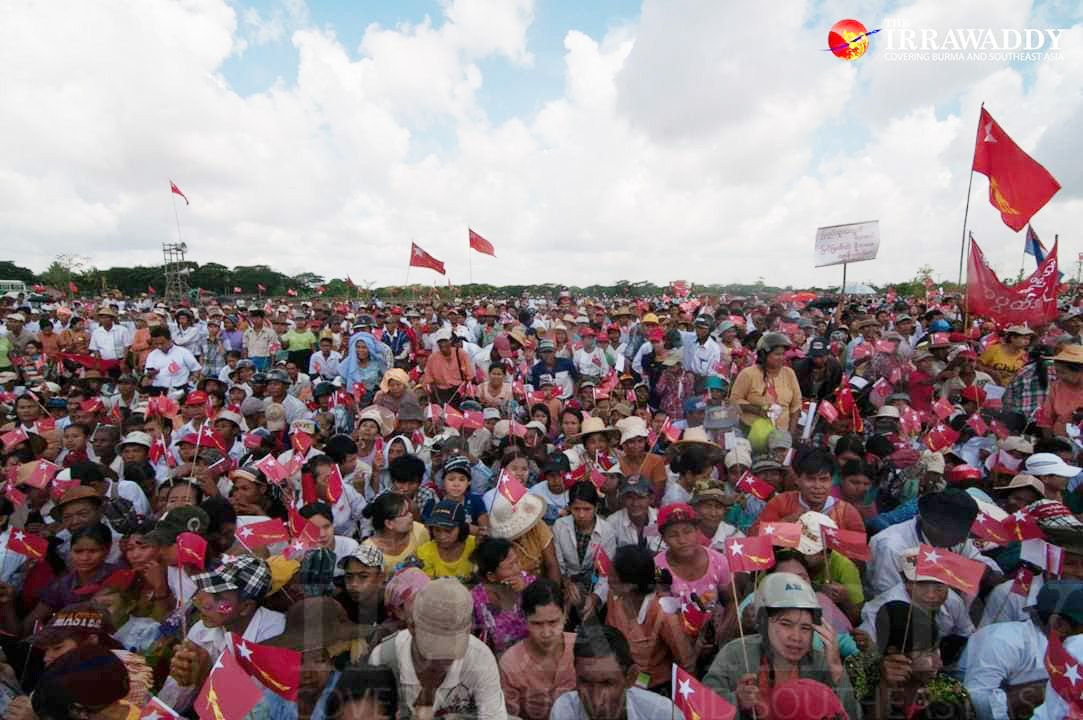
The implication is that the NLD believes there are more provisions that could potentially be amended. But if the items and chapters to be discussed are to be selected based on their undemocratic nature, the 168 items the party cited five years ago all remain valid candidates for amendment.
Certainly, changing them all is out of the question. The NLD knows just how far it can go with this task. Even its initial attempt to form the joint committee faced strong resistance from all military appointees and USDP lawmakers in Parliament.
Bearing those practical limitations in mind, the following analysis examines which parts of the Constitution the NLD is most likely to try to amend in the coming months and years, possibly before the upcoming election in 2020.
The main reason the NLD selected those 168 items for amendment is because they are so clearly out of step with basic human rights and democratic principles. I have grouped the proposed amendments into three main areas, based on their ultimate aim:
- To reduce the role of the military and its commander-in-chief in politics, in accordance with basic human rights and democratic principles.
- To limit the president’s executive power in the regions and ethnic states, as well as in the judicial system
- To decentralize state power by granting a degree of autonomy to parliaments in the regions and states, allowing them to elect their own chief ministers and giving them greater decision-making power, rather than taking instructions from Naypyitaw.
Beyond these main goals, there are some other interesting proposals such as changing the current national flag to better reflect the country’s aspirations since independence, and amending Article 432, which protects ex-ruling generals from being sued, effectively placing them above the law.
The NLD’s proposed amendments start with Chapter 1 and cover almost all of the charter’s 15 chapters. This analysis does not examine the details of every proposal made, but will touch on the main items.
Rejecting the notion of ‘qualified’ democracy
The suggested amendments to Chapter 1 of the charter—“Basic Principles of the Union”—are highly likely to face serious objections from military appointees and the USDP. However, they are likely to receive a warm welcome from other parties and, of course, the public.
- In Chapter 1, Article 6(d) says, “the Union’s consistent objectives are [the] flourishing of a genuine, disciplined multi-party democratic system” (emphasis added). The NLD suggests getting rid of the word “disciplined”, reasoning that “‘democracy’ doesn’t need to be modified.”
When talking about democracy, officially or unofficially, the military, previous military regimes and ex-military officials have always used the phrase “disciplined democracy”. To their way of thinking, democracy is tantamount to anarchy. This kind of brainwashing is typical of military institutions in Myanmar; perhaps its common to all authoritarian countries.
- Article 6(f) is the main article enshrining the extraordinary privileges the military enjoys in the political sphere, “enabling the Defense Services to be able to participate in the National political leadership role of the State.” The NLD suggests this phrase be removed, citing another charter provision, Article 4, which reads, “The sovereign power of the Union is derived from the citizens…” The NLD explains: “One single organization ought not to permanently play a leadership role.” That article specifically is one of the most unpopular articles in the Constitution among the public.
- Article 8 says: “The Union is constituted by the Union system.” The NLD suggests this be amended to make it clear that the country’s political system is a federal Union, as the current description, “the Union system”, is ill defined. The party officially aims to form a democratic federal Union; almost all ethnic political parties and armed groups endorse this policy.
- In a single stroke, Article 14 renders the Constitution essentially undemocratic, as it guarantees that 25 percent of the seats in all parliaments shall be held by military appointees nominated by the commander-in-chief. The NLD says this is against democratic principles, but does not seek to remove it. Instead, it suggests amending it step by step through negotiations. The NLD knows that it’s not practical to seek to remove it right away under the current democratic transition, in which the military still holds key political, legislative and administrative powers beyond those related to territorial defense.
Obviously, the military and its powerful commander-in-chief will not accept an immediate change to this particular article under current circumstances. Amending it could take years or even decades. Holding 25 percent of the seats in all parliaments is a key political privilege for the military. It is one of the articles the NLD can’t amend at the moment, and this will remain the case for the remainder of the government’s current tenure, which ends in 2021.
- Article 17(b) guarantees the commander-in-chief extraordinary powers to nominate military personnel to positions related to defense, security and border administration in the central government, as well as in all 14 regional and state governments. The NLD proposes amending this on the grounds that it violates democratic principles, but will also proceed slowly in this area.
- Another very sensitive item is Article 20(c), which states that the commander-in-chief is the supreme commander of all armed forces (including the police force). The NLD proposes that the article be removed, arguing that the Police Department shouldn’t be under the command of the military.
- Article 40(c) is a special source of concern for many people, as it essentially hands the commander-in-chief the power to stage a coup. The article states that the commander-in-chief “has the right to take over and exercise State sovereign power in accord with the provisions of this Constitution” if there is a state of emergency that could cause disintegration of the Union, disintegration of national solidarity or loss of sovereign power, or in the face of attempts to take power through wrongful forcible means such as an insurgency or other forms of violence.
Again, the NLD does not suggest removing this article; instead, it seeks to add the phrase, “In agreement with the Union Parliament” before “the commander-in-chief has the right…” to reflect the fact that sovereign power is derived from the country’s citizens.
Inclusion of the phrase would unequivocally take back this extraordinary power currently wielded by the commander-in-chief. It is also in line with democratic principles. Again, however, making this change would require the commander-in-chief’s consent.
Strict one-term limit for president
Chapter 3—Head of State—includes an article that has become internationally and domestically notorious. Article 59(f) was written with a specific individual in mind: Daw Aung San Suu Kyi, the de facto leader of the current government. This is just one of a score of articles targeted for change among the many interesting proposals made by the NLD in regards to this chapter.
- Article 59(f) bars a person whose spouse and children are foreign citizens from becoming president. The NLD suggests removing it, saying that Article 59(b) contains sufficient protections. It says the president “shall be a citizen of Myanmar who was born of both parents who were born in the territory under the jurisdiction of the Union and being Myanmar Nationals.”
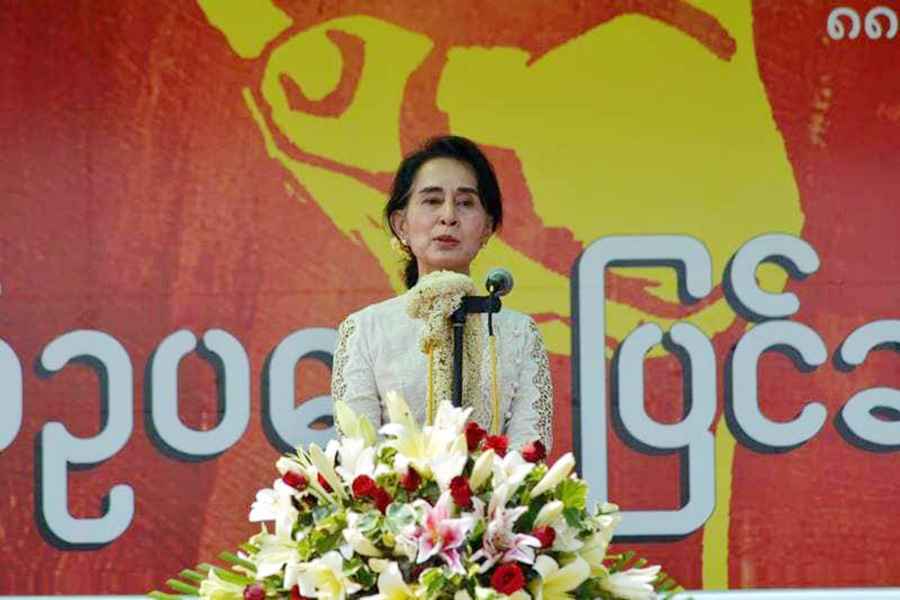
The NLD also points out that there is no such article in the constitutions of other countries, and there were no such restrictions in either of Myanmar’s previous constitutions approved in 1947 and 1974. The party is right to point out that this particular article targets Daw Aung San Suu Kyi, who was then opposition leader and under house arrest when the previous military regime drafted the Constitution in 2008. But the current military leaders and the formerly ruling USDP have shown an unwillingness to change it so far.
- Article 59(d) is also among those most criticized by the public. Laying out the qualifications of the president and vice presidents, it states that they “shall be well acquainted with the affairs of the Union such as political, administrative, economic and military” issues (emphasis added). The NLD suggests changing the word “military” to “security” in order to enable a president to be elected without such a qualification. The NLD says the existing provision, too, is against international norms.
- Article 60(b) concerns another privilege guaranteed to the military. The NLD suggests it be removed in order to reduce the role of the military in politics. The article grants not only the two houses of Parliament—the Upper and Lower houses—the right to elect a vice president, but also requires a group of military officials appointed by the commander-in-chief to elect a third vice president. (The military candidates are always ex-generals.) The president is to be elected from among the three vice presidents. The NLD calls for the removal of the article, saying there should be only one vice president. This article is obviously intended to grant the military executive power in the government. It is of course undemocratic—and intended to pave the way for a high-ranking military official to become president.
- This proposal made by the NLD sounds very interesting. Article 61(c) says that the president and the vice presidents “shall not serve more than two terms”. This is in line with international democratic norms. But the NLD goes further, suggesting that presidents serve not more than one term (five years). The NLD says such a change would prevent the revival of an authoritarian system in the country and keep incumbents from trying to hold on to power.
This suggestion is clearly the product of a mentality haunted by the country’s five-decade-long military authoritarian system. Its main aim is to ensure that new leaders, even elected ones, can’t hold power indefinitely, like previous ruling generals including General Ne Win, who ruled the country for 28 years (from 1962 to 1988) and Senior General Than Shwe, who ruled the country for 19 years (from 1992 to 2011).
No immediate challenge to the military chief’s power to appoint lawmakers
In Chapter 4—Legislature—the NLD suggests gradually removing the right granted to the commander-in-chief to nominate military officials for appointment to 25 percent of the seats in all Union, regional and state parliaments. In this chapter, most amendments suggested by the NLD relate to privileges granted to the commander-in-chief and his parliamentary appointees.
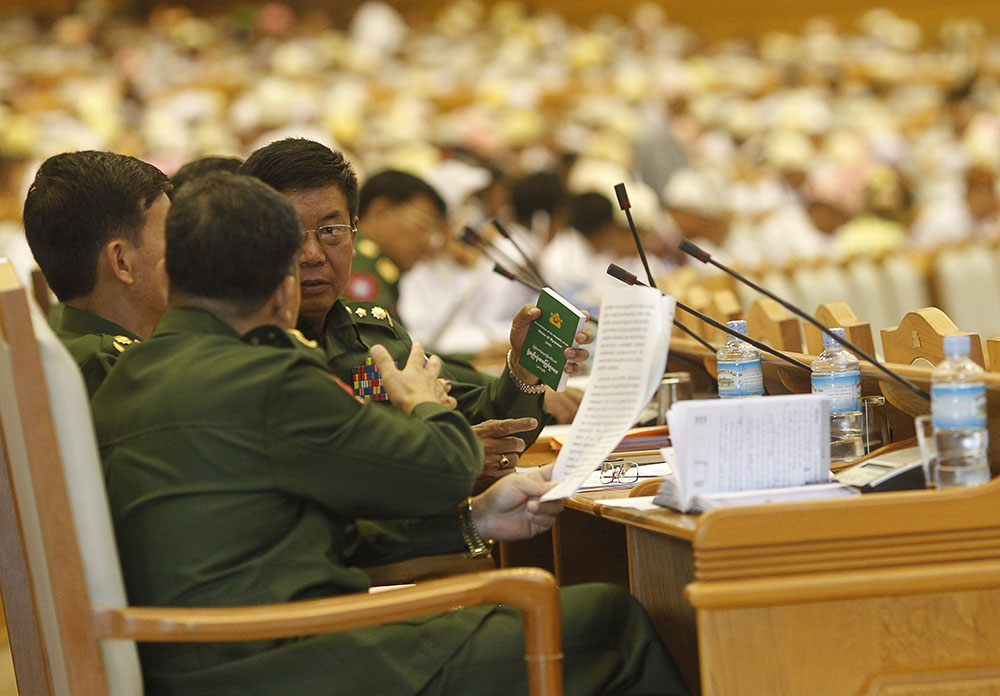
Chapter 5—Executive—includes a very controversial article relating to the formation of the National Defense and Security Council (NDSC). The NLD suggests amending many clauses in this chapter in order to reduce the power of the president to grant more autonomy to parliaments and the governments of regions and ethnic states.
- Many observers believe that Article 201 makes the NDSC the country’s most authoritative body when it comes to making decisions when urgent issues or emergencies arise. The controversy is over its constitutionally mandated composition: It has 11 members—the president, two vice presidents, the two house speakers of the People’s Parliament and National Parliament, the military commander-in-chief and deputy commander in chief, and the ministers of foreign affairs, defense, home affairs and border affairs. The military/civilian ratio is six to five. Critics point out that when it comes to voting on emergency issues, the military will always have the final say.
Like many, the NLD is most concerned about this, which is why its government has never called an official NDSC meeting in the three years it has been in office. Instead, during crises it has called meetings of many or all of those officials, along with additional high-ranking officials. The NLD also appears to believe that the council’s composition is not appropriate politically. It suggests that two deputy house speakers be added, as the current 11 members include “deputies” like vice presidents and deputy commanders-in-chief. It also suggests including only one vice president. This suggestion sounds logical in terms of the ratio of vice presidents and vice commanders-in-chief. It would give the council 12 members—seven from the civilian side (comprising representatives of the government and Parliament)—while the military will have only five members. This would clearly reduce the power of the military on the council.
- In articles 248 to 286 of this chapter, the NLD’s suggested amendments involve reducing the executive power of the president in order to grant regional and state parliaments and governments a degree of autonomy. The NLD provides the clear and concise reason that regions and states must have a degree of autonomous power.
The proposed changes include direct elections for the chief ministers of those regions and state governments by their respective parliaments, and giving each chief minister the power to independently form his or her own government, including deciding on the number of ministries needed. All suggestions made by the NLD in this chapter would ensure chief ministers have significant autonomy.
- Article 204(b) gives the president power “to grant amnesty in accord with the recommendation of” the NDSC. The NLD suggests modifying this to “grant amnesty in accord with the recommendation of the Union Parliament and the National Defense and Security Council,” saying decisions involving amnesty should include the recommendations of elected members of Parliament.
Supreme Court the final arbiter
During the decades of military rule, the judicial system in Myanmar was infamous for its lack of independence. Chapter 6 of the Constitution—Judiciary—places the Supreme Court under military Courts-Martial in terms of legal authority: “Without affecting the powers of the Constitutional Tribunal and the Courts-Martial, the Supreme Court of the Union is the highest Court of the Union.”
- The NLD suggests making the Supreme Court unconditionally the highest court in the Union. Thus, it suggests removing the phrase, “Without affecting the powers of the Constitutional Tribunal and the Courts-Martial” from the above provision, making the Supreme Court truly the highest legal authority.
- The NLD suggests eliminating all articles from 320 to 336, which involve the Constitutional Tribunal and its formation, in order to hand all its duties to the Supreme Court. It also proposes modifying the articles to curb the president’s power over the Supreme Court. All of these suggestions are aimed at ridding the judicial system of the influence of the Courts-Martial and executive power.
Chapter 7 must surely be the strangest of any included in any country’s constitution. It concerns the Defense Services, known as the Tatmadaw in Burmese. Even in Myanmar, this chapter stands out, as it had no equivalent in the country’s previous constitutions in 1947 and 1974. It appears before the chapter on citizens and their rights. This particular chapter shows that the military has become more powerful constitutionally than at any time in the country’s history. In fact, this chapter has no place in a democratic constitution, but again the NLD is not proposing to eliminate it entirely. But even a “realpolitik” approach may not favor it, as this is the biggest “landmine” in the NLD’s path to reform. The NLD will face withering opposition from the military if it even suggests removing it—even though, at the end of the day, this chapter shouldn’t exist.
- The NLD suggests amending two of the chapter’s eight articles. Article 338 reads: “All the armed forces in the Union shall be under the command of the Defense Services.” The NLD suggests having the Police Department administered by its own ministry. Currently, the department is under the Home Affairs Ministry, whose minister is an Army general appointed by the commander-in-chief.

According to the Constitution, the Myanmar Police Force is under the control of the military. / The Irrawaddy - Article 339 grants the Tatmadaw absolute authority in regard to safeguarding the country, which can be interpreted as giving the commander-in-chief undiluted power in this sphere. It reads: “The Defense Services shall lead in safeguarding the Union against all internal and external dangers.” The NLD suggests modifying this to say, “The Tatmadaw should take [responsibility for this] duty under the leadership of the head of state.”
The 2008 Constitution is riddled with conditions, but Chapter 8—Citizens, Fundamental Rights and Duties of the Citizens—has more than its share of unnecessary conditions. The NLD highlights two articles in this chapter, relating to arrest without remand and forced labor.
- Article 359 says: “The Union prohibits forced labor, except for hard labor [imposed] as a punishment for crime duly convicted, and duties assigned by the Union in accord with the law in the interest of the public” (emphasis added). The NLD suggests doing away with forced labor in any circumstances. The issues of forced labor attracted a lot of notoriety to Myanmar under the previous military regime.
- Another unnecessary clause in this chapter, according to the NLD, is the following bolded passage in Article 376: “No person shall, except in matters of precautionary measures taken for the security of the Union or prevalence of law and order, peace and tranquility in accord with the law in the interest of the public, or matters permitted according to an existing law, be held in custody for more than 24 hours without the remand of a competent magistrate” (emphasis added). The NLD suggests amending this to: “No person shall be held in custody for more than 24 hours without the remand of a competent magistrate.”
As a reason, it says the article should be in harmony with Article 21(b) of Chapter 1, Basic Principles of the Union, which reads: “No citizen shall be placed in custody for more than 24 hours without the permission of a Court.”
- A proposal by the NLD relating to Article 383 is likely to irritate the military and its proxy USDP, as it calls for the elimination of three civic “duties”, which were printed on the front page of every book and publication across the country under the former regimes.
The article reads: “Every citizen has the duty to uphold: a) non-disintegration of the Union; b) non-disintegration of national solidarity; c) perpetuation of sovereignty.” The NLD suggests eliminating the entire article, saying it echoes an earlier article in the Constitution and pointing out that these are duties not only of citizens but also of the government.
No immunity for the military chief, even in emergencies
Chapter 11—Provisions on State of Emergency—which gives special powers to the commander-in-chief, especially during a state of emergency, contains a phrase that, in the context of this Constitution, perhaps shouldn’t surprise us.
- Article 418 reads: “Notwithstanding anything contained in the Constitution, commencing from the day of transfer of the sovereign power to the commander-in-chief of the Defense Service, it shall be deemed that the members appointed and assigned duties by approval of the relevant Hluttaws [parliaments] in accord with the Constitution…” (emphasis added). The NLD suggests removing the phrase in bold, saying the Constitution shall not be violated at any time and that no action is above the Constitution.
- Article 432 of this chapter is one of the most important provisions in the charter because it protects ex-ruling generals from prosecution for wrongdoings committed in the past. It is also one of the most unpopular with the public. The article basically means “No legal action shall be taken” against any civilian or military service members (including the military chief), and their organizations shall not face legal consequences for their actions in times of emergency (when the military chief or NDSC is exercising sovereign power).
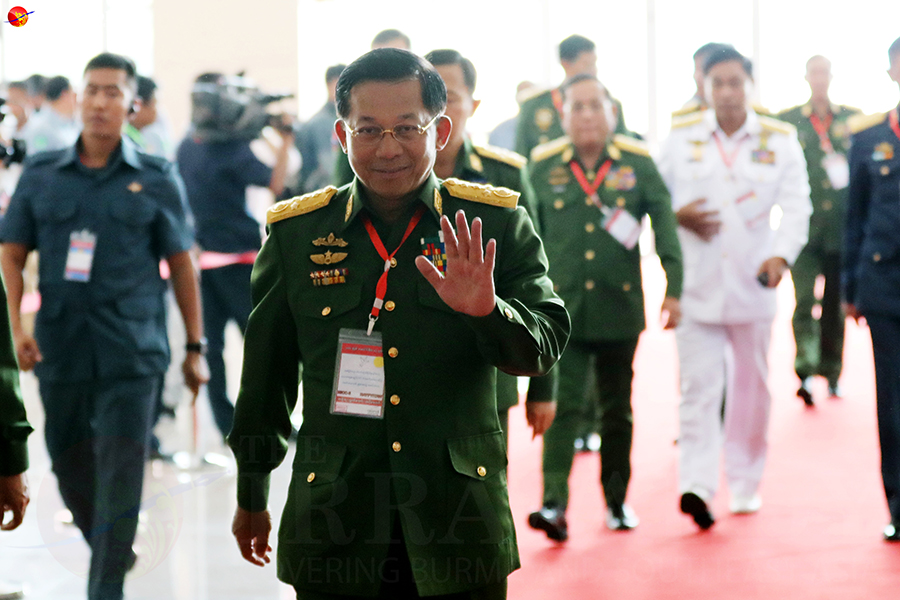
The NLD proposes removing the clause “no legal action shall be taken”, claiming it is not in accord with international standards. Needless to say, the military and USDP will resist this strongly.
Article 436 of Chapter 12—Amendment of the Constitution—is one of the most controversial articles in the charter as its purpose is to make it difficult to make even reasonable amendments.
- Article 436(a) says that if it is necessary to amend a number of crucial articles (most of which privilege the military) in certain chapters, “it shall be amended with the prior approval of more than seventy-five percent of all the representatives of the Pyidaungsu Hluttaw [Union Parliament], after which in a nation-wide referendum only with the votes of more than half of those who are eligible to vote” (emphasis added). Obtaining more than 75 percent of votes is virtually impossible, as military officials appointed by the commander-in-chief occupy 25 percent of seats in Parliament.
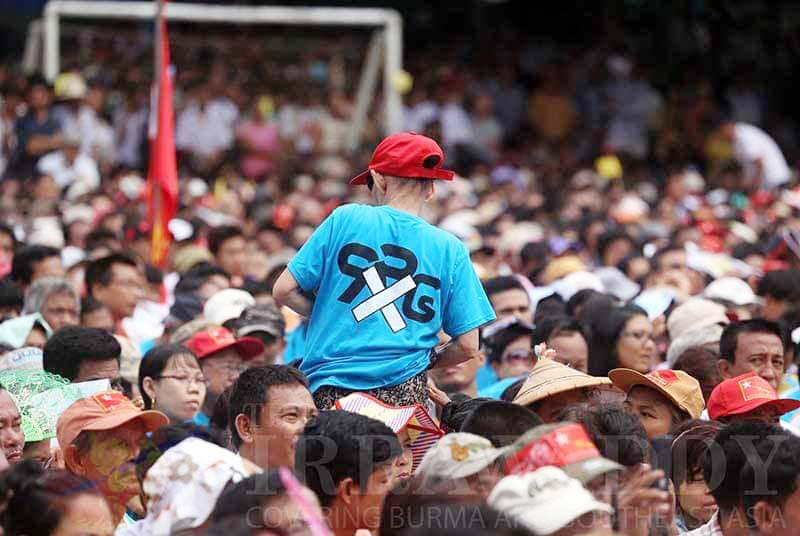
This is quite likely the most difficult part of the constitution to change. This article, the NLD says, gives the military the upper hand at the expense of the public when it comes to amending the Constitution. The NLD adds that equality and justice are important for national reconciliation. It suggests the article be amended so that those articles it mentions can be amended with the approval of more than seventy-five percent of all elected representatives (excluding the military appointees) of the Union parliament, or by more than 50 percent of all the representatives (including military lawmakers). It seems fair but is unlikely to be accepted by the military.
Uninspiring national symbol
Since the Constitution was approved in 2008, many people have complained about the new national flag, which bears no resemblance to previous flags. Chapter 13 concerns the State Flag, State Seal, National Anthem and the Capital.

- In this chapter, the NLD only suggests replacing the flag. It points out that it is wrong to entirely do away with the previous flag, which was a source of great inspiration to the public as it was associated with the country’s successful struggle for independence. It adds that the current flag is also quite similar to the flags of some other countries.
These are among the many articles the NLD is highly likely to try to amend. To get all of them amended remains a virtual impossibility for the foreseeable future, especially prior to the 2020 election, which is likely to be the NLD’s tentative timeframe. But if even one of the provisions discussed above remains in the Constitution, we can’t regard it as fully democratic.
This analysis begs an obvious question: Why doesn’t the NLD draft a new constitution, rather than try to amend so many items in the current one? Some political observers have suggested just that. But such an option is simply not possible. The military does not even accept the NLD’s initiative to amend the charter; that it would entertain the notion of a new charter is out of the question. Therefore, we can safely say it’s not a practical solution under current political conditions.
As for the NLD, it seems determined to push the issue as far as it can in the coming months with the aim of securing a significant quantity of substantive amendments. To achieve this, the NLD will need to implement, at a minimum, the following four strategies: 1) strike a balance between seeking reform and “realpolitik”; 2) use its majority in Parliament in a democratic manner; 3) marshal all of its public support to help it achieve its goal; and 4) coax the commander-in-chief into adjusting his political position sufficiently to accept its proposals.
As it does so, the party faces one fundamental restriction—not to engage in the kind of counterproductive activity that could provoke a military coup. That is the bottom line. Beyond that, there shouldn’t be any limitations on its efforts.

















